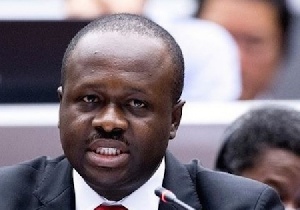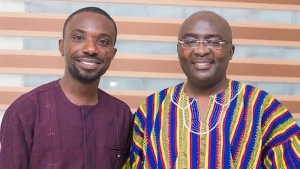StarTimes Communication Network Technology Group has expressed worry about the abrupt and unlawful termination of a US$97million digital terrestrial television migration contract with government, as this has a huge tendency of impeding economic diplomacy between the two countries.
The Chinese company, which earlier won the contract to supply and install a reliable energy-efficient and cost-effective Digital Terrestrial Television (DTT) network solution in April 2012, has already filed a law suit against government to institute arbitral proceedings at the International Commercial Court, London, over the issue — expecting to claim about US$200million for breach of contract.
A Vice President of StarTimes Group, interacting with 13 senior journalists from Ghana and Nigeria on a two-week media visit to China, explained that the development is not a happy story for international business transactions that involve the two countries.
“This is not a good way between Ghana government and StarTimes Group, as this is part of a bilateral agreement and has a lot of influence on Chinese companies operating in Ghana and their confidence in the international investors.
“As a business entity, we have to obey international laws and contracts,” a Vice President of the company who wants to remain anonymous told the media in Beijing, China, during a tour of the company’s premises and modern facilities.
The Vice President argued that termination of the business contract between the two entities is a great loss to the company and China-Ghana bilateral relation — observing that the country has a very long way to go in terms of infrastructure but lacks funding.
The Vice President said in June 2011 government opened an international bidding whereby enterprises all over the world showed interest in the project. Seven companies left and StarTimes remained, then soon after StarTimes won the contract to execute the project.
In 2012 the contract was signed, and in 2014 the Eximbank of China finished its appraisal and approved the loan for commencement of the project.
“After signing of the DTT loan framework agreement between the two countries on April 10, 2015, he confirmed that the fund was released by the Chinese government through the Eximbank of China for the project to take off.”
But the contract was later abruptly terminated by government, and that after all attempts at using diplomatic means to resolve the impasse between the two countries failed to yield any fruit.
On July 21, 2015, StarTimes formally raised its arbitration issue with the International Commercial Court.
This has raised enormous concerns among the international investing community and technology experts about Ghana’s readiness to embrace modern technology while leveraging on bilateral relations and diplomacy.
According to an agreement between Africa and the ITU in 2006, Africa was supposed to have carried out digital migration by June 2015. Over 156 countries signed the ITU agreement in Geneva which sets up a frequency plan for Europe, Africa and parts of Asia as part of a binding treaty to switch off analogue transmission.
This was aimed at ensuring a higher clarity of TV programmes with great quality, and more diversity in television. This digitalisation came with challenges that included but were not limited to capital-intensity and technology-intensity and clarity.
Digital migration is the shift from analogue broadcasting to digital broadcasting, involving many changes of the transmission signals as well as making sure that members of the public can enjoy high definition television.
The migration is executed through digital terrestrial television, which helps to reduce the use of spectrum, provides more capacity than analogue, and provides better quality signals.
The implementation of digital technology, DTT, provides more channels and better quality of picture and sound using aerial broadcasts to a conventional antenna (or aerial) instead of a satellite dish or cable connection.
DTT is transmitted on radio frequencies through the airwaves, which is similar to standard analogue television except for one primary difference — the use of multiplex transmitters to allow reception of multiple channels on a single frequency range.
According to the latest report of Digital Television Forecast in sub-Sahara Africa released by Digital Television Study in England, digital television household penetration in sub-Sahara will soon exceed 50% and it is estimated that digital migration will reach almost every family by 2020.
The report also states that about 20 million television households will appear in sub-Saharan Africa by end of 2010, indicating that there is still about 100 million households without television.
Television household penetration will reach only 38.4% by 2020, which is seen as the long-term potential in this area by the chief analyst of Digital Television Study, Semon.
By the end of 2013 there were 11 million subscribers of Pay-TV, among which 8.5 million users had opted for satellite television. By 2020, the number will reach 26.65 million. Pay TV revenue in sub-Saharan Africa is currently about US$3.17billion, estimated to increase by 69% to US$5.35billion by 2020.
StarTimes’ senior officials have vowed to invest in the country’s telecommunications market, as it will still go ahead and implement its expansion strategies and projects in Ghana despite the legal battle.
The company, which currently boasts of being the leading Africa digital TV operator is assisting to ensure that the African continent and media development progresses to the next level in digital television broadcasting, as is evident in the successful digital transformation of Tanzania. The company is now a partner to Africa in its effort to migrate from analogue to digital.
StarTimes covers 80% of the African continent’s population with a massive distribution network of 200 brand-halls, 3,000 convenience stores and 5,000 distributors, with a featured content platform and 440 authorised channels consisting of news, movies, series, sports, entertainment, children’s programmes, fashion, religion — combining satellite and terrestrial DTV systems to provide an open and secure digital wireless platform.
In 2002 StarTimes started developing its African markets, and in 2007 received the first digital TV operator licence issued by Rwanda. ?In recent years StarTimes has received licences and registered companies in 28 African nations, 16 of which have their broadcasting networks operational including Nigeria, Kenya, Tanzania, South Africa, Uganda, Democratic Republic of the Congo, Republic of the Congo, Mozambique, Rwanda, Burundi, Guinea, Madagascar, Malawi, Republic of Central Africa and Ghana.
StarTimes offers advanced technology with high-quality services, having started business in 1988 with just 30 staff; and has now grown to over 4,000 staff across 16 countries.
StarTimes Group is a Chinese multinational technology company headquartered in Beijing, focusing on system integration, technology provision and is a network operator.
It owns a featured content platform, with 440 authorised channels for its wide range of local and international viewing publics.
Business News of Thursday, 5 November 2015
Source: B&FT
StarTimes sues gov’t over unlawful termination of contract
Entertainment












